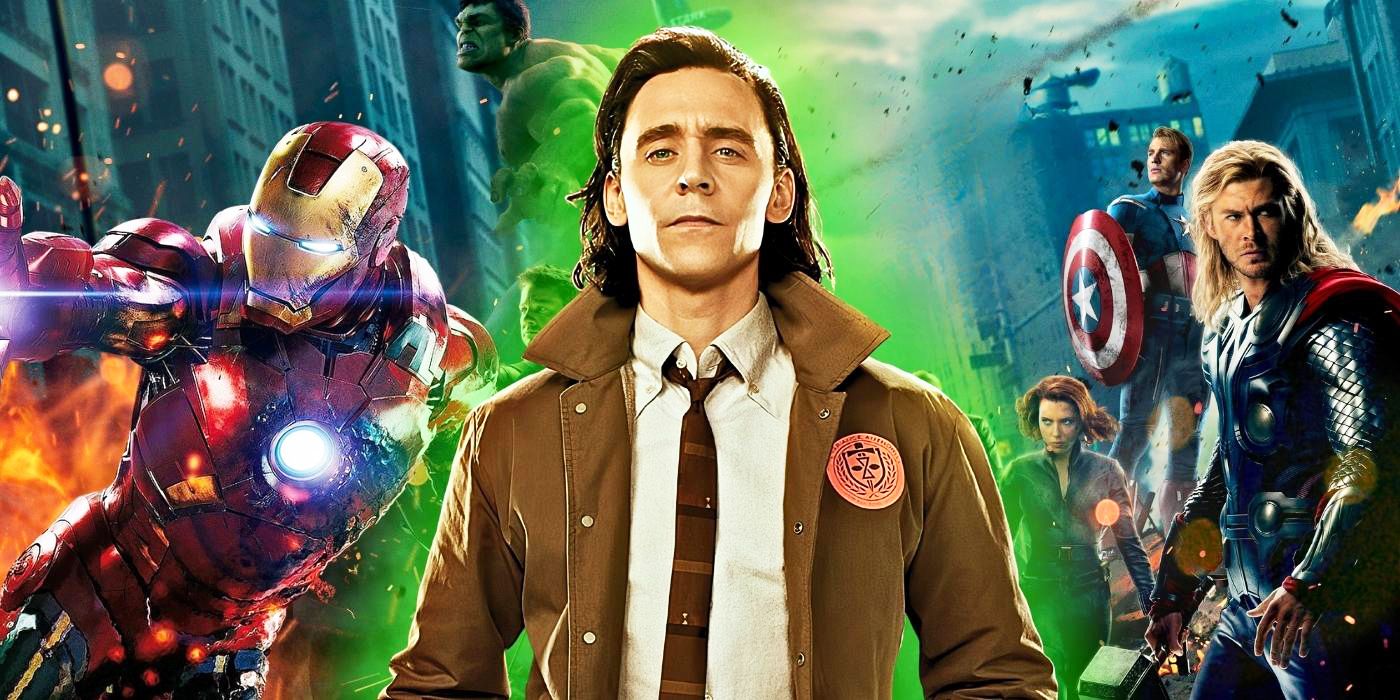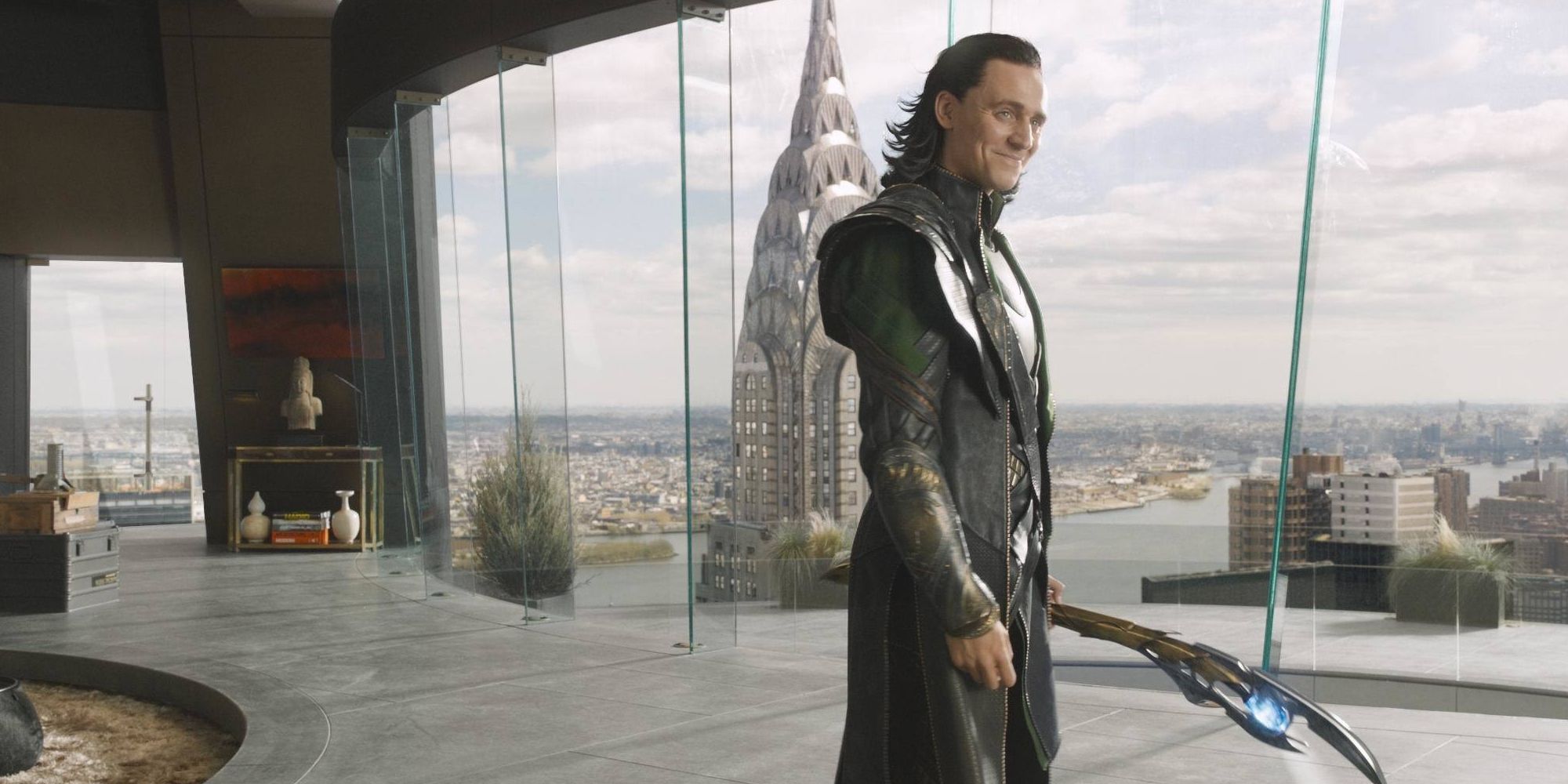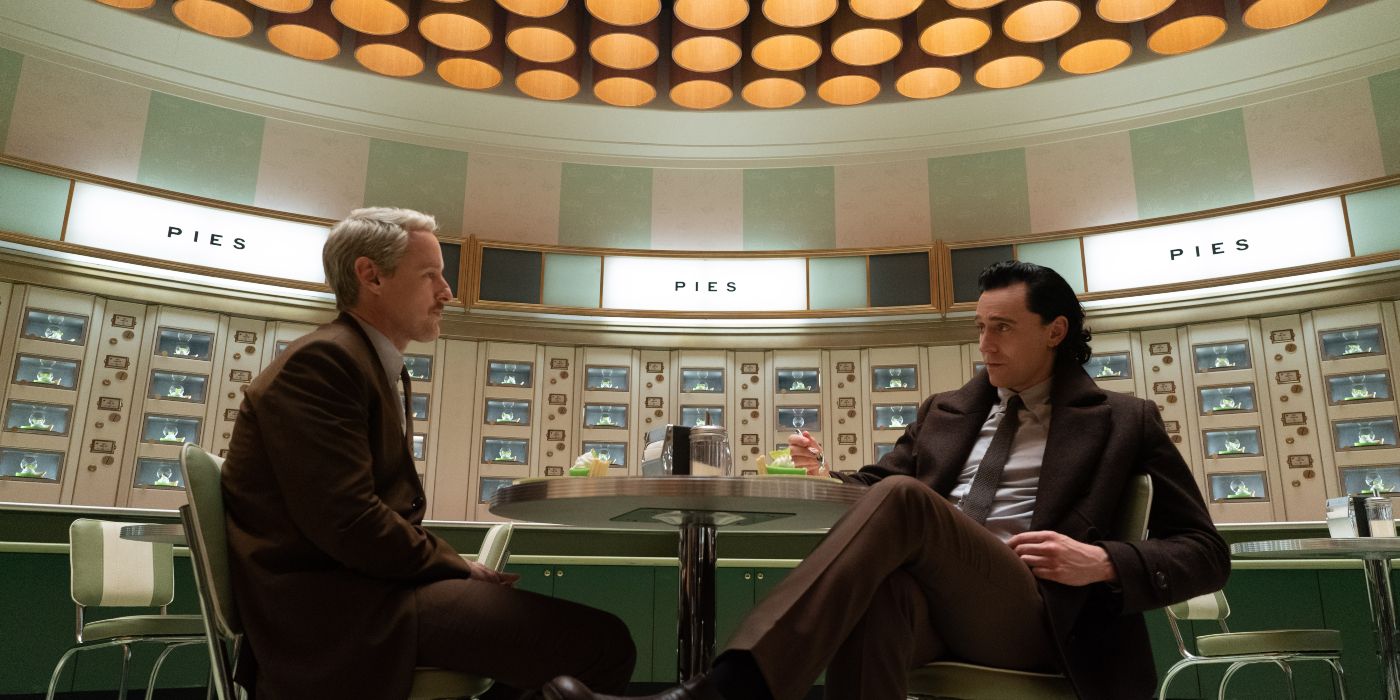Editor's Note: The following contains spoilers for Loki Season 2, Episode 2.
It's always nice to see someone we care about signaling they've moved on from something that wasn't good for them, right? It's what happens in this week's episode of Loki, titled "Breaking Brad." When Loki (Tom Hiddleston) and Mobius (Owen Wilson) are having pie at the TVA headquarters after failing their first attempt at interrogating former Hunter X-5, who now goes by Brad Wolfe (Rafael Casal), Mobius apologizes for snapping at Brad and says "it wasn't tactical." Loki immediately says it's okay and casually mentions "that time" when he threw Tony Stark (Robert Downey Jr.) off the window after their confrontation at Stark Tower in The Avengers, saying that wasn't tactical either.
Seeing someone like Loki talking so casually about something so dysfunctional as holding the whole of New York City hostage with an alien army just because he was angry at his father and his brother is crazy, but it carries a deeper meaning about who Loki was back then and who he is now. Granted, we don't know exactly how much time has passed between those two moments in his life, but, if we look at him as someone who's recovering from emotional and psychological trauma, time isn't really that important, what matters is the actions he has taken since then to be able to put such awful things in perspective.
Who Was Loki Back at the Battle of New York in 'The Avengers'?
Before we go on, it's important to establish that the Loki who's the title character of the Disney+ series is not the same character we see from Thor: The Dark World all the way to Avengers: Infinity War. In Avengers: Endgame, the part of the time heist sequence that's set right after the Battle of New York in 2012 has Loki grab an unsupervised Tesseract and vanish, thus putting the events of his own series in motion as a variant on a branching timeline. So this Loki will never go on to oust Odin (Anthony Hopkins) as King of Asgard in the post-credits scene of The Dark World, meet his redemption in Thor: Ragnarok, and ultimately die in Infinity War. All that character development... never happened.
This is why in Season 1 of Loki he's always babbling about his "glorious purpose" because that's what he sees as his, well, purpose in life. He was bullied and traumatized in his youth while living in the shadow of Thor's (Chris Hemsworth) greatness, which led to him becoming envious and jealous of his brother. Later on, in Thor, he discovers he isn't even related to them and actually is the biological son of King Laufey (Colm Feore) the leader of Asgard's worst enemies, the Frost Giants of Jotunheim, who are seen as monsters by the Asgardians. So suddenly discovering he is himself "a monster" is the recipe for turning an emotionally immature individual into a villain.
Shortly before mentioning the Battle of New York to Mobius, Loki gets taunted by Brad in the interrogation room at the TVA. Brad basically recites the lyrics to Taylor Swift's "Anti-Hero" in the second person to tell Loki that it's him, he's the problem, and that everything he ever does to try and help is actually a way for him to atone for the horrible things he did in the past, but it never works. Brad goes deeper and says that Loki always loses. That's also what Mobius says to Loki in Episode 1 of Season 1, that Loki's purpose is actually to always be defeated by the heroes on their way to becoming the best versions of themselves. This is a harsh thing to say to anyone, but, back then, Loki needed to hear it.
Mobius' goal when saying that to Loki isn't to diminish him, but rather to show him that, for all the awful things he's done in life up until then, he was being given a chance to do some good by helping him find Sylvie (Sophia Di Martino). In fact, Loki's purpose was anything but glorious, and he needed to face that in order to grow. In the Sacred Timeline, the main Loki will discover his true worth by helping Thor save the Asgardians from Ragnarok, but that isn't possible with the Loki variant in the series. Likewise, he grew a lot by working for the TVA and became much more open and aware of his place in the multiverse thanks to it.
How Has Loki Been Able To Grow the Same Amount in a Shorter Time?
One of the things Brad throws at Loki's face is the fact that he didn't use to care about "lives being at stake." Loki is directly responsible for the deaths of lots of people, and the indirect cause of many others too, so why does he care? We don't know exactly how much time has passed since he joined the TVA (because time passes differently at the TVA), but it can't have been much. In the Sacred Timeline, it took him four whole movies and the very real threat of Thanos (Josh Brolin) for him to take people losing their lives as something important, so how come this Loki grew so much in such a short period of time?
Because he had to literally witness himself triggering the events that would ultimately lead to a multiversal war. Well, not himself, but Sylvie, who's also a Loki variant and as such, bears similar trauma — with the bonus of being a woman, which is completely off the script for the TVA. Being the narcissistic godlike entities they are, it's natural that Loki and Sylvie would be attracted to one another, but Loki wasn't prepared to see Sylvie's wrath against He Who Remains (Jonathan Majors). The main villain of the series did a number on Loki and frightened him to his core, but Sylvie didn't even flinch. In Episode 5 of Loki Season 1, he met many other Loki variants, all of them the "losers" they were scripted to be, but Sylvie thought she was defying this notion by getting her vengeance against He Who Remains for creating the TVA.
She wasn't, because another defining trait of Loki is that he is always the one who triggers apocalypses and similar events, both in Norse mythology and in the comics and movies. Even indirectly, Loki is responsible for the events that set Ragnarok in motion when he sides with Thanos years before, and he knows it. At the end of "Breaking Brad," we see General Dox (Kate Dickie) and her army pruning countless branched timelines and, thus, killing trillions of beings. Sylvie may say whatever she wants about the TVA (and she's right, too), but this huge loss of life is a consequence of her killing He Who Remains and branching off the multiverse. In the Season 1 finale, Loki understood that He Who Remains wasn't playing games and meant what he said, but Sylvie killed him all the same.
It may feel like there hasn't been enough time for Loki to get this sort of character development in just eight episodes in his series, but it actually makes sense for him to have matured this much after seeing many different versions of himself, especially Sylvie. This made him realize what is part of his nature and what is beyond his control. He may still be a trickster and a villain deep down, but at least he understands why he does the things he does and sees the stakes that lie behind them. Understanding he caused the Battle of New York because he was angry at Odin and Thor is a huge step for him, and it doesn't matter if he's inherently good or bad, he also deserves a chance to heal. Sylvie may not be aware of this yet, but, as a Loki variant, she also deserves it. Let's just hope she gets her moment, too.
The Big Picture
- Loki revealing his past actions of holding New York City hostage were because he was angry at Thor and Odin shows his growth from a dysfunctional villain.
- The Loki in the Disney+ series is a variant of the original character, and his purpose in life is to be defeated by heroes, but through his experiences with the TVA, he has become more open and aware of his place in the multiverse.
- Despite the short period of time he has spent with the TVA, Loki has grown significantly due to witnessing the consequences of his actions and seeing the impact of his variant counterpart, Sylvie.



